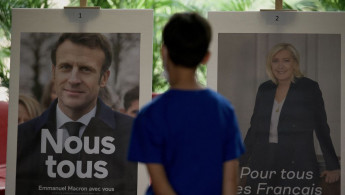Macron vs Le Pen: Where France’s presidential candidates stand on immigration, Islam, the Middle East
Polls opened in France on Sunday morning for the second round of the presidential election, held every five years. The first official results will be published tonight.
As in the last election, the duel pits incumbent Emmanuel Macron, who presents himself as a liberal centrist, and far-right leader Marine Le Pen, who would like to roll back immigration, slash asylum numbers, and reduce the influence of European institutions.
Stakes are particularly high for French Arabs and Muslims, many of whom worry about seeing their rights rolled back if Le Pen wins. Although France does not record data on citizens' ethnic and religious background, the country is estimated to host the largest Muslim minority in Western Europe.
So what are the two candidates' takes on key issues that could affect France's Arab and Muslim minorities?
Immigration and asylum
On immigration, both Macron and Le Pen have pushed for more restrictive migration policies and a stricter enforcement of migration law.
While Macron has pushed for a "more efficient" asylum system and wants to make procedures "less cumbersome", he says asylum seekers whose applications have been rejected should be forced to leave French territory. On immigration, Macron wants to restrict access to long-term visas, give preference to French-speaking applicants, and grant more visas to citizens of countries that "cooperate" with France on migration issues.
Meanwhile, Le Pen wants to radically alter asylum procedures by requesting that asylum seekers submit their file through French embassies and consulates abroad, only allowing those who obtained refugee status to come to France. She has also pushed for people's refugee status to be regularly reassessed.
Under Le Pen, "illegal" immigrants would no longer be able to apply for legal status. She also wants to amend immigration laws to make deportations easier.
The far-right leader also wants to alter nationality laws. Currently, children born in France from foreign parents can obtain French nationality if they meet certain conditions - like having lived in France for at least five years. Le Pen wants to scrap the measure, to limit people's ability to pass on French nationality through marriage, and allow the state to revoke nationality.
Islam
Both candidates have said they will crackdown on schools, mosques and organisations promoting a "radical" vision of Islam, and strictly control foreign funding for mosques.
Le Pen has run xenophobic and Islamophobic campaigns in her multiple bids for the presidency. She wants to outlaw halal and kosher meat slaughtering, and to ban the wearing of the hijab in the street.
Recently, aides of the far-right leader hinted at a change of position, saying the Islamic headscarf would at first be banned in public buildings and administrations. However, she doubled down on her original stance in interviews this week.
Macron has positioned himself as a rampart against these ideas and said religious minorities would be free to practice their faith under his leadership - but during his time in office, Macron's government passed a controversial law against "separatism", widely seen as discriminatory to Muslims.
His government also dissolved a major anti-racist organisation monitoring Islamophobia, and toyed with passing other laws that would punish Muslims for their appearance and lifestyle choices.
Foreign policy
What sets the two opponents furthest apart are their takes on foreign policy. As a pro-European, Macron wants to reinforce France's role in the EU and clearly supports Ukraine against Russia's invasion.
In the Middle East, however, Macron has frequently strayed from his purported liberalism and democratic values.
Under his leadership, France has developed a strong relationship with Egypt's Abdel Fattah al-Sisi, including cooperation in the security sector that allegedly helped Cairo commit human rights abuses. Macron was also the first Western leader to pay a visit to the Saudi Crown Prince Mohamed bin Salman, breaking his international isolation since the brutal murder of journalist Jamal Khashoggi.
Le Pen rejects the growing power of European institutions and believes European law and regulations should not take precedence over French law. She wants to pull France out of NATO's integrated command.
Although she outright condemned Russia's current war in Ukraine, Le Pen had previously expressed admiration for the Russian president Vladimir Putin.
She has also said France should renew diplomatic ties with Syria and its dictator Bashar al-Assad, saying he was "the most reassuring solution" for the war-torn nation's future.





 Follow the Middle East's top stories in English at The New Arab on Google News
Follow the Middle East's top stories in English at The New Arab on Google News


